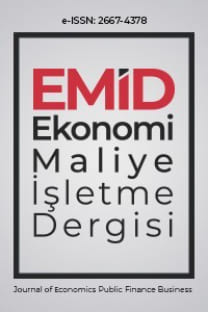TÜRKİYE’DE SİYASİ PARTİLERİN YOLSUZLUKLA MÜCADELEYE BAKIŞLARI: PARTİ PROGRAMLARINA DAYALI BİR DEĞERLENDİRME
Yolsuzluk, Yolsuzlukla Mücadele, Türkiye, Parti Programları.
THE PERSPECTIVES OF POLITICAL PARTIES ON ANTI-CORRUPTION IN TURKEY: AN EVALUATION BASED ON PARTY PROGRAMS
Corruption, Fight Against Corruption, Turkey, Party Programs,
___
- AK Parti (2001). Adalet ve Kalkınma Partisi Programı: Kalkınma ve Demokratikleşme, Erişim : 14.01.2022: https://acikerisim.tbmm.gov.tr/xmlui/handle/11543/926.
- Akçay, S. (2000). “Yolsuzluk, Ekonomik Özgürlükler ve Demokrasi”. Muğla Üniversitesi Sosyal Bilimler Enstitüsü Dergisi, (1): 1-15.
- Aktan, C. C. (2015). “Political Corruption: an Introductory Study on Terminology and Typology”. International Journal of Social Sciences and Humanity Studies, 7(1): 47-65.
- Amundsen, I. (1999). Political Corruption: An Introduction to the Issues. Chr. Michelsen Institute. Erişim: 14.12.2021: https://www.cmi.no/publications/file/1040-political-coiTuption.pdf,.
- Anderson, S., Anechiarico, F., (2019). Corruption and Corruption Control: Democracy in the Balance, New York: Routledge.
- Anderson, C. J., Tverdova, Y. V. (2003). “Corruption, Political Allegiances, and Attitudes Toward Government In Contemporary Democracies”. American Journal of Political Science, 47(1): 91-109.
- Bayley, D. H. (1966). “The Effects of Corruption in a Developing Nation”. Western Political Quarterly, 19(4): 719 732.
- Berksoy, T., Yıldırım, N. E. (2017). “Yolsuzluk Kavramına Genel Bir Bakış: Problemler ve Çözüm Önerileri”, Journal of Awareness, 2(1): 1-18.
- Blechinger, V. (2002). Corruption and Political Parties: Sectoral Perspectives on Corruption, Presentation prepared by MSI, Erişim:19.12.2021,https://pdf.usaid.gov/pdf_docs/PNACT879.pdf.
- CHP, (2008). Cumhuriyet Halk Parti Programı: Çağdaş Türkiye İçin Değişim, Erişim: 14.01.2022 https://acikerisim.tbmm.gov.tr/xmlui/handle/11543/918.
- Çingi, S. (1994). “Yolsuzluk Olgusu ve Ekonomik Analizi Üzerine Notlar”. Hacettepe Üniversitesi İktisadî ve İdarî Bilimler Fakültesi Dergisi, (12): 1-18.
- Emir S., Kıymık H., Apalı, A. (2020). “Muhasebe Alanında Yürütülen Çalışmaların Nitel İçerik Analizi Tekniğiyle Değerlendirilmesi (2015-2019)”. Mali Çözüm, 30(162): 95-126.
- Ertekin, E. (2008). “Roma Çağında Cilicia’dan Yolsuzluk Örnekleri”. OLBA, (16): 361-384.
- Friedrich, C. I., (2007). Corruption Concepts in Historical Perspective, in Political Corruption: Concepts and Contexts, (Eds.) A. J. Heidenheimer; M. Johnston, 3rd Edition, pp. 15-24, New Jersey: Transaction Publishers.
- Hacib, Y. H. (2017). Kutadgu Bilig (Çev. Ayşegül Çakan). IV. Basım, İstanbul: İş Bankası Kültür Yayınları
- İYİ Parti, (2017). İyi Parti Programı, [Erişim: 14.01.2022: https://iyiparti.org.tr/storage/img/doc/iyi-parti-guncel parti-program.pdf.]
- Johnston, M., 2000. Corruption And Democratic Consolidation, Hamilton: WP, Erişim: 11.12.2021: http://citeseerx.ist.psu.edu/viewdoc/download?doi=10.1.1.203.1955&rep= re p1&ty pe=pdf> , Erişim Tarihi, 11.12.2021.
- Katz, R. S. (1986). “Party Government: A Rationalistic Conception”, F. G. Castles; R. Wildenmann (Eds.), Visions and Realities of Party Government, (Volume 1), 31-71. New York: Walter de Gruyter.
- Kıral, B. (2020). “Nitel Bir Veri Analizi Yöntemi Olarak Doküman Analizi”. Siirt Üniversitesi Sosyal Bilimler Enstitüsü Dergisi, 8(15): 170-189.
- Mény, Y. (1996). “Politics, Corruption and Democracy: The 1995 Stein Rokkan Lecture”. European Journal of Political Research, 30(2): 111-123.
- MHP, (2009). Milliyetçi Hareket Partisi Programı: Geleceğe Doğru, Erişim: 13. 01.2022: https://acikerisim.tbmm.gov.tr/handle/11543/923.
- Myint, U. (2000). “Corruption: Causes, Consequences and Cures”. Asia Pacific Development Journal, 7(2): 33 58.
- Nye, J. S. (2007). “Corruption and Political Development: A Cost-Benefit Analysis”, A. J. Heidenheimer; M. Johnston (Eds.), Political Corruption: Concepts and Contexts, (3rd Edition), 281-302, New Jersey: Transaction Publishers.
- Razzante, R., (2020). “The Fight Against Corruption”, A. Balloni, R. Sette (Eds) Handbook of Research on Trends and Issues in Crime Prevention, Rehabilitation, and Victim Support, 167-186, Hershey/Pennsylvania: IGI Global.
- Rothstein, B. (2018). “Fighting Systemic Corruption: The Indirect Strategy”. Daedalus, 147(3): 35-49.
- Sallan Gül, S., Kahya N., Ö. (2021). “Sosyal Bilimlerde İçerik ve Söylem Analizi”, Pamukkale Üniversitesi Sosyal Bilimler Enstitüsü Dergisi, 42 (Özel Sayı 1): 181-198.
- Šumah, S. (2018). “Corruption, Causes and Consequences”. V. Bobek (ed.), Trade and Global Market, IntechOpen. DOI: 10.5772/intechopen.72953.
- Uluslararası Şeffaflık Derneği, (2022). Türkiye’de Yolsuzluk, Erişim: 25.04.2022, https://seffaflik.org/wp content/uploads/2022/04/Turkiyede-Yolsuzluk-Neden-Nasil-Nerede.pdf.
- Uslaner, Eric M. 2015. ‘‘The Consequences of Corruption’’. P. M. Heywood (Ed.), Routledge Handbook of Political Corruption, 199–211. London: Routledge.
- Williams, A. (2021). Corruption Definitions And Their Implications For Targeting Natural Resource Corruption. Topic Brief, U4 Anti-Corruption Resource Centre, Erişim: 15.12.2021: https://files.worldwildlife.org/wwfcmsprod/files/Publication/file/ 6fzh5hqkch _Topic_Brief_Corruption_definitions_and_their_implications_for_targeting_natural_reso urce_corruption.pdf, Erişim Tarihi: 15.12.2021.
- Woo, J., Choi, E. (2018). Political Corruption and Democratic Governance, Maryland: Rowman & Littlefield Publishing.
- Zúñiga, N., Jenkins, M. (2018). Methodologies For The Analysis of Political Party Programmes Berlin: Transparency International. Erişim: 04.01.2022, https://knowledgehub.transparency.org/assets/uploads/helpdesk/Methodologies-analysis-party-programmes.pdf
- Yayın Aralığı: Yılda 2 Sayı
- Başlangıç: 2018
- Yayıncı: Adil AKINCI
İŞE BAĞLILIK KONUSUNDA TÜRKİYE’DEKİ YAZILMIŞ LİSANSÜSTÜ TEZLERİN ANALİZİ
TURİZMİN CO2 EMİSYONUNA ETKİSİ: PANEL VERİ ANALİZİ
TEMEL BİR ÇALIŞMA STANDARDI OLARAK GELİŞMEKTE OLAN ÜLKELERDE ÇOCUK İŞÇİLİĞİ
AB ÜLKELERİNDE MALİ SÜRDÜRÜLEBİLİRLİK: PANEL REGRESYON ANALİZİ
BİLİME KARŞI ALGININ METAFORLAR YARDIMIYLA ÖLÇÜLMESİ: SOSYOLOJİ VE İŞLETME ÖĞRENCİLERİ ÖRNEĞİ
MUHASEBE MANİPÜLASYONU YÖNTEMİ OLARAK YARATICI MUHASEBE
MÜKELLEF HAKLARININ TÜRKİYE’DE VE SEÇİLMİŞ BAZI ÜLKELERDE KARŞILAŞTIRMALI BİR DEĞERLENDİRMESİ
